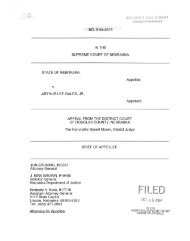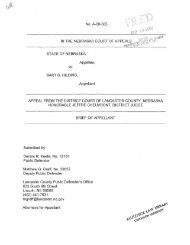Financial Articulation of a Fiduciary Duty to Bondholders with ...
Financial Articulation of a Fiduciary Duty to Bondholders with ...
Financial Articulation of a Fiduciary Duty to Bondholders with ...
You also want an ePaper? Increase the reach of your titles
YUMPU automatically turns print PDFs into web optimized ePapers that Google loves.
1986] FIDUCIARY DUTY TO BONDHOLDERS<br />
through inves<strong>to</strong>r bargaining in the efficient capital market, 18 2 and<br />
(2) inves<strong>to</strong>rs in all investment vehicles expect appropriate gains from<br />
8 3<br />
their investments-<br />
Should risk-neutral and risk-liking inves<strong>to</strong>rs (such as Appraisal<br />
Credi<strong>to</strong>rs and Contractual Credi<strong>to</strong>rs), 1 8 4 <strong>with</strong> or <strong>with</strong>out their possession<br />
<strong>of</strong> unique investment facts and beliefs, be penalized by permissive<br />
(judicially <strong>to</strong>lerated) wealth expropriations because <strong>of</strong> "the<br />
existence <strong>of</strong> diversification-not its employment"? 18 5 The question<br />
can be recast as follows: should inves<strong>to</strong>rs' risk-neutral and risk-liking<br />
states <strong>of</strong> mind be penalized? (The penalization <strong>of</strong> states <strong>of</strong> mind<br />
is the domain <strong>of</strong> the theory <strong>of</strong> criminal law.) 18 6 To penalize such inves<strong>to</strong>rs<br />
would be <strong>to</strong> punish mental nonconformity <strong>with</strong> procrustean<br />
idealized mathematical conditions regarding risk averseness and<br />
efficient market portfolios in an otherwise completely noncriminal<br />
context.187 Such penalization is perverse and unfair because these inves<strong>to</strong>rs<br />
are the victims and not the perpetra<strong>to</strong>rs <strong>of</strong> such wealth expropriations.'<br />
88 Risk diversification does not rationally "exist" for<br />
risk-neutral and risk-liking inves<strong>to</strong>rs. Moreover, such penalization is<br />
contrary <strong>to</strong> a reasonable fiduciary "constraint that no inves<strong>to</strong>r be<br />
made worse <strong>of</strong>f by the transaction.' 8 9 "The requirement that<br />
everyone receive at least the value <strong>of</strong> his investment under existing<br />
conditions serves much the same function as the rule against<br />
182. See supra notes 28, 43-44, 59-60 and accompanying text.<br />
183. Risk-averse inves<strong>to</strong>rs seeks gains which are related <strong>to</strong> investment covariance<br />
risks, whereas risk-neutral inves<strong>to</strong>rs seek the greatest expected gains and risk-liking<br />
inves<strong>to</strong>rs seek the greatest possible gains. Risk-averse inves<strong>to</strong>rs dominate the marketclearing<br />
prices for securities in the efficient capital market; bond economic gains and<br />
losses are determined from such market-clearing prices.<br />
184. See supra text accompanying notes 121-22.<br />
185. Easterbrook & Fischel, supra note 122, at 713.<br />
186. American civil law is directed <strong>to</strong>ward damages, whereas American criminal<br />
law is directed <strong>to</strong>ward states <strong>of</strong> mind. In general, an objective truth finder regarding<br />
an individual's state <strong>of</strong> mind would obviate the requirement for an "act" or "harm"<br />
under the theory <strong>of</strong> our criminal laws - pure thought crimes would exist - because<br />
the "act" and "harm" are not relevant per se but only as indica<strong>to</strong>rs <strong>of</strong> the individual's<br />
forbidden state <strong>of</strong> mind. If the "act" were central <strong>to</strong> our criminal laws, then the "act"<br />
would be penalized <strong>with</strong>out the requirement for a concurrent forbidden state <strong>of</strong> mind.<br />
If "harm" were central <strong>to</strong> our criminal laws, then "insanity" would not be a defense<br />
because it does not undo the "harm"; and the crimes <strong>of</strong> "attempt," "conspiracy," and<br />
"solicitation" would not exist because there is no "harm" per se in these crimes. For a<br />
definition <strong>of</strong> these quoted terms and for a discussion <strong>of</strong> criminal law theory, see J.<br />
HALL, LAW, SOCIAL SCIENCE AND CRIMINAL THEORY (1982), and J. HALL, GENERAL<br />
PRINCIPLES OF CRIMINAL LAW (2d ed. 1960).<br />
187. See supra notes 54-58 and accompanying text.<br />
188. There exists a corporate financing policy under which unanticipated wealth<br />
expropriations either do not occur or are neutralized. Galai & Masulis, supra note 27,<br />
at 66 & n.37, 68-69; K. Shastri, supra note 26, at 55-57.<br />
189. Easterbrook & Fischel, supra note 122, at 715.








